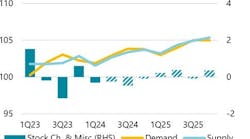Sam Fletcher
Senior Writer
HOUSTON, Aug. 6 -- Energy prices continued to tumble with crude closing below $120/bbl for the first time since early May, amid indications of slower US economic growth and lack of major disruption of Gulf Coast oil and gas production by tropical storm Edouard.
"After shedding nearly $6/bbl over the course of the past two sessions, front-month crude oil futures have stagnated just below the $120/bbl threshold," said analysts Aug. 6 at Pritchard Capital Partners LLC, New Orleans. "While prices have found a modicum of support this morning—likely tied to expectations for a decline in crude oil inventories—most market watchers agree sentiment remains largely bearish."
The market needs to maintain support at $120/bbl "to prevent the downward acceleration from the large layers of option puts [giving investors the right to sell—or put—a fixed number of shares at a fixed price within a given period] positioned below that level," said Olivier Jakob at Petromatrix, Zug, Switzerland. On the New York Mercantile Exchange on Aug. 5, the front-month crude contract "spent most of the trading session in defense of that level but failed in the end," Jakob said. This is the "first warning sign that the bulls could be starting to lack ammunition," he said. "The global correction in commodities and the sharp drop in natural gas have reduced some of the war coffins and the risk remains for further capitulation."
Tropical Storm Edouard
Tropical Storm Edouard, with 65 mph winds, made landfall Aug. 5 near Sabine Pass on the Texas-Louisiana border and was soon downgraded to a tropical depression as it moved across southwest Texas, providing some relief from the heat. Only a day earlier, Texas set a 2008 record for peak electricity use and was just short of an all-time record.
The US Minerals Management Service reported Aug. 5 that workers were evacuated ahead of the storm from 154 of the 717 manned platforms and 9 of the 125 rigs operating in the Gulf of Mexico. About 6% of the oil and 12.3% of the natural gas production from the gulf was shut in.
"But that didn't reflect the full production impact of Edouard," Pritchard Capital analysts said. The deepwater Independence Hub was scheduled over the weekend to restore production of more than 800 MMcfd of gulf gas after a 4-day outage to inspect the integrity of leak repairs on its export pipeline. That was delayed, however, due to heavy seas generated by the storm. Also, part of Cameron Parish in Louisiana was evacuated, forcing the shutdown of several major gas processing plants.
In other news, the Baku-Tbilisi-Ceyhan pipeline was closed Aug. 5 by an explosion and fire at a pump station near Refahiye in eastern Turkey. That pipeline transports crude from the Azeri-Chirag-Guneshli oil field in the Caspian Sea to the port of Ceyhan, Turkey, on the Mediterranean for export to world markets. Local officials denied that the explosion was the result of sabotage, prompting speculation that the damage can be quickly repaired. However, Kurdish rebels are active in eastern and southeastern Turkey and have sabotaged gas and oil pipelines in the past. The pipeline's capacity was expected to increase to 1.2 million b/d this year.
US inventories
The Energy Information Administration said Aug. 6 commercial US crude inventories increased 1.7 million bbl to 296.9 million bbl during the week ended Aug. 1, exceeding Wall Street's expectations of a 300,000 bbl build. Gasoline stocks fell 4.4 million bbl to 209.2 million bbl in that period, vs. a Wall Street consensus of a 1.1 million bbl decline. Distillate fuel inventories increased by 2.8 million bbl to 133.3 million bbl, exceeding Wall Street's prediction for an increase of 2.2 million bbl. Propane and propylene inventories gained 1.4 million bbl to 47.2 million bbl.
Imports of crude into the US increased by 188,000 b/d to 10.2 million b/d that same week. However, the input of crude into US refineries dropped 123,000 b/d to 15 million b/d with units operating at 87% of capacity. Gasoline production rose to 9.1 million b/d, while distillate fuel production dropped to 4.6 million b/d.
Energy prices
The September contract for benchmark US light, sweet crudes traded as low as $118/bbl prior to closing at $119.17/bbl, down $2.24 Aug. 5 on NYMEX. The October contract lost $2.47 to $119.22/bbl. On the US spot market, West Texas Intermediate at Cushing, Okla., was down $2.24 to $119.17/bbl. Heating oil for September dropped 6.81¢ to $3.28/gal on NYMEX. The September contract for reformulated blend stock for oxygenate blending (RBOB) declined 4.38¢ to $2.96/gal.
The September natural gas contract was unchanged at $8.73/MMbtu on NYMEX. On the US spot market, gas at Henry Hub, La., fell 53.5¢ to $8.64/MMbtu. "Spot month natural gas futures settled unchanged, but more deferred contracts retreated in active trading," said Pritchard Capital Partners. "Traders cited an interest by funds and managed accounts toward the sell side of the market, and in the longer term analysts suggested that if there were no major production-disrupting hurricanes this season, prices could fall more than another dollar."
In London, the September IPE contract for North Sea Brent crude lost $2.98 to $117.70/bbl. Gas oil continued to tumble, with the August contract falling $37.50 to $1,066.50/tonne.
The average price for the Organization of Petroleum Exporting Countries' basket of 13 reference crudes dropped $4.58 to $116.22/bbl on Aug. 5.
Contact Sam Fletcher at [email protected].

